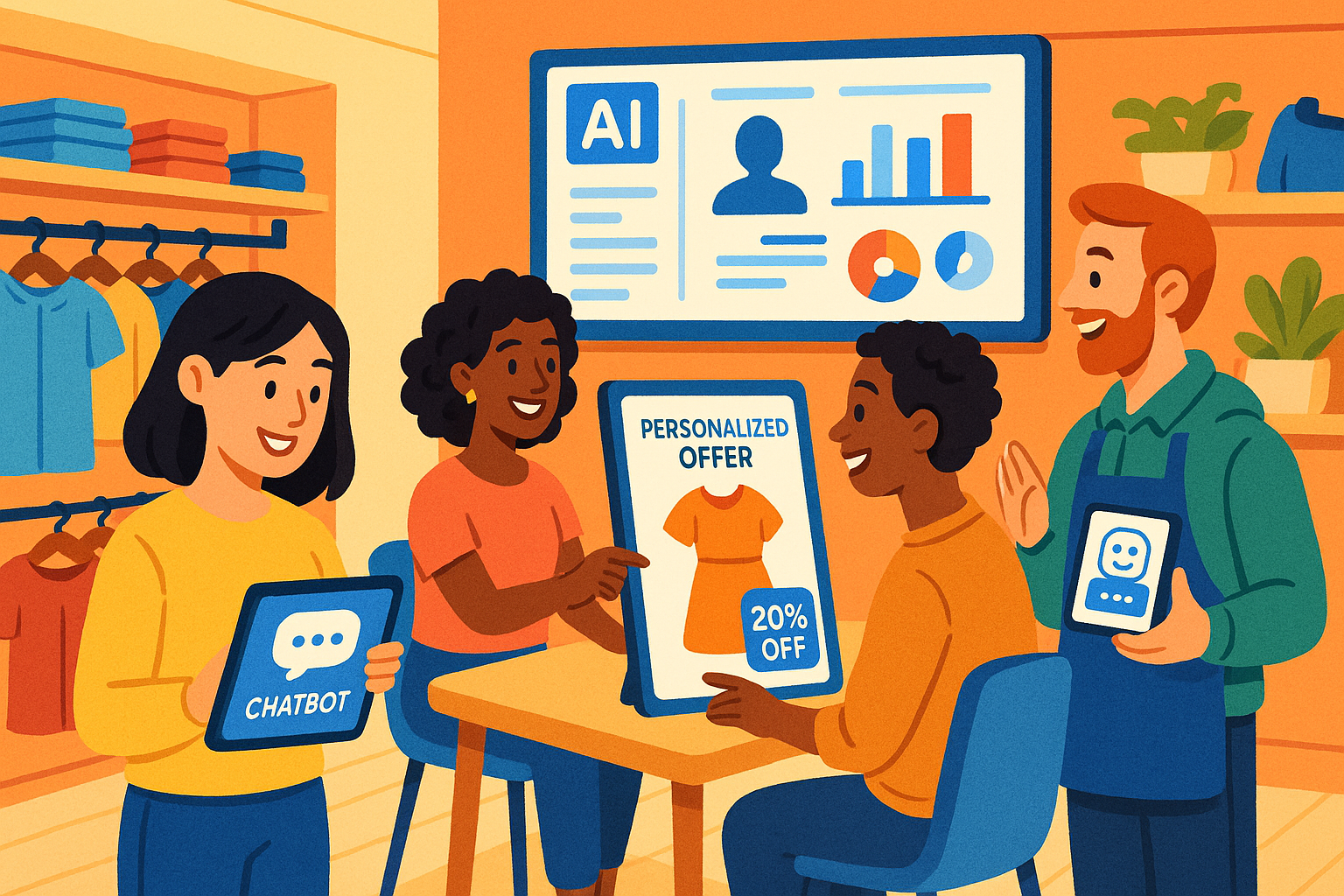How AI-Driven Personalization is Transforming Customer Retention for Small Businesses by 2025

Introduction
As we approach 2025, it's clear that AI-driven personalization is fundamentally transforming how small businesses retain customers. By providing hyper-personalized experiences and automating retention strategies, smart AI technologies are equipping smaller enterprises with powerful tools to enhance customer engagement and drive growth. These advancements are not just for the giants of the industry—small businesses are now able to compete on a level playing field, engaging customers in ways that were previously unimaginable.
Embracing Personalization through AI
At the forefront of this revolution is the concept of personalized campaigns and customer segmentation. AI algorithms have the remarkable ability to analyze real-time data such as purchase history, browsing behavior, and engagement patterns. This data-driven approach allows businesses to dynamically segment their customers and deliver tailored messages at precisely the right moments. Tools previously available only to large corporations are now accessible to small retailers through AI-powered CRM platforms like Zendesk and Desk365, making customized customer interactions a reality for businesses of all sizes.
Moreover, the proactive nature of churn prediction has become a game changer. Nowadays, AI can analyze behavioral signals to identify customers who might be at risk of leaving. Armed with this intelligence, businesses can initiate outreach with custom retention offers or engaging content, addressing potential issues before they escalate and significantly reducing the occurrence of lost revenue.
Strengthening Loyalty and Engagement
In addition to direct engagement strategies, AI is reshaping loyalty programs. Imagine being able to offer free shipping to one customer while providing early access to promotions for another, enhancing individual value propositions. This tailored approach is proving to be highly effective at fostering repeat business, ultimately cementing customer loyalty.
One of the most exciting developments in recent years is the rise of conversational AI. With the introduction of chatbots and virtual assistants, customers now enjoy 24/7 instant support that’s contextually aware of their previous interactions. This not only enhances customer experience but also frees up human staff to handle more complex inquiries. Additionally, AI’s capabilities in sentiment analysis further amplify the personalization of support services, ensuring that customers feel understood and valued.
A Cohesive Omnichannel Experience
As customers interact with brands across multiple touchpoints, the need for a cohesive omnichannel strategy becomes paramount. AI excels in coordinating messaging across various platforms—be it email, SMS, social media, or offline channels—ensuring a seamless and personalized journey for customers. This level of tailored communication reinforces relationships and keeps customers engaged throughout their lifecycle.
Furthermore, AI can help streamline content generation, allowing businesses to create targeted marketing copy and social media posts that resonate with audience preferences. This shift not only boosts engagement but also streamlines resource allocation, giving small businesses a significant edge.
Emerging Trends and Innovations
Looking forward, the blending of emotional intelligence with AI is an emerging trend that holds great promise. By incorporating emotional cues into AI systems, businesses can create interactions that feel more human, ultimately enhancing customer satisfaction.
As acquisition costs continue to rise, there is a noticeable shift in focus from merely attracting new customers to nurturing existing ones. This change is prompting small businesses to invest in AI technologies to foster loyalty among their clientele rather than relying solely on attracting new faces.
Moreover, the rise of intuitive, cloud-based AI platforms means that even non-technical small business owners can leverage advanced personalization and analytics without needing an extensive IT team. This democratization of technology is opening doors for many.
Real-World Success Stories
Real-world examples speak volumes about the impact of these innovations. Take Zendesk's AI chatbots, for instance. Small retailers using this technology have experienced significant reductions in customer service response times, leading to higher satisfaction ratings and noticeable increases in repurchase rates.
In another case, a small apparel brand utilized AI-driven email segmentation for product recommendations, resulting in a 27% increase in repeat purchases and a staggering 40% reduction in churn over an 18-month period. Similarly, businesses generating AI-tailored email and SMS campaigns for micro-segments have reported outcomes like doubled open rates and increased customer lifetime value.
The Measurable Impact of AI
Statistics underline the tangible benefits of adopting AI for customer retention. A remarkable 66% of small businesses have noted productivity boosts through AI, linking this technology to both cost savings and revenue growth. It’s clear that retention-focused AI campaigns yield better results than traditional methods, creating higher engagement, minimizing churn, and delivering greater customer lifetime value.
Navigating Challenges Ahead
However, integrating AI isn’t without its hurdles. Data privacy and security remain a top concern, especially as customers demand responsible management of their personal information and companies strive to comply with evolving regulations. Additionally, ensuring model accuracy continues to challenge small businesses, given their often limited data volumes compared to larger firms.
And let's not forget the need for change management; integrating AI requires adjustments in processes and skill sets, emphasizing the importance of user-friendly platforms that are accessible to smaller teams.
Future Outlook
As we look to the future, it’s evident that customer retention will hinge on adaptive, emotionally aware personalization and seamless omnichannel engagement. Businesses that invest in these technologies today stand to gain a significant competitive advantage. In fact, experts predict that by 2030, AI will be woven into nearly every customer interaction for small businesses, making retention as much a science as it is an art.
In conclusion, the intertwining of AI-driven personalization, innovative segmentation methods, and accessible automation tools is redefining how small businesses cultivate customer loyalty. Embracing these technologies not only enhances engagement but also boosts profitability, thereby equipping small businesses to thrive in an increasingly complex digital landscape.